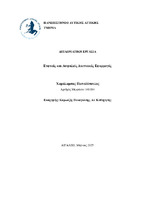Ευφυείς και ασφαλείς δικτυακές εφαρμογές
Intelligent and secure network applications

Διπλωματική εργασία
Συγγραφέας
Παπαδόπουλος, Χαράλαμπος
Ημερομηνία
2025-03-06Επιβλέπων
Karkazis, PanagiotisΛέξεις-κλειδιά
Software-defined networking (SDN) ; Ασφάλεια δικτύων ; Network function virtualization (NFV) ; Μηχανική μάθηση στην κυβερνοασφάλεια ; Υπολογιστική αιχμής (Edge & fog computing)Περίληψη
Η παρούσα διπλωματική εργασία επικεντρώνεται στις ευφυείς και ασφαλείς δικτυακές εφαρμογές,
εστιάζοντας στη διαχείριση, την εικονικοποίηση και την ασφάλεια σύγχρονων δικτυακών
υποδομών. Η μελέτη αναλύει τεχνολογίες όπως το Software-Defined Networking (SDN), το
Network Function Virtualization (NFV) και τα δίκτυα επόμενης γενιάς (5G & 6G), τα οποία
προσφέρουν μεγαλύτερη ευελιξία και αποδοτικότητα στη διαχείριση των επικοινωνιακών
υποδομών.
Ένα από τα βασικά θέματα της εργασίας είναι η ασφάλεια των SDN, καθώς η
κεντρικοποιημένη τους αρχιτεκτονική τα καθιστά ευάλωτα σε επιθέσεις, όπως DoS (Denial of
Service) και παραβίαση ελέγχου πρόσβασης. Εξετάζονται επίσης μηχανισμοί ασφαλείας, όπως η
κρυπτογράφηση επικοινωνιών, οι πολιτικές διαχείρισης ταυτότητας και η χρήση μηχανικής
μάθησης για την ανίχνευση ανωμαλιών και επιθέσεων σε πραγματικό χρόνο.
Η μελέτη διερευνά, επίσης, τη σύνδεση των SDN με τεχνολογίες εικονικοποίησης, όπως το
NFV και τα εικονικά δίκτυα (VLAN, VPN). Αναλύονται οι προκλήσεις και τα οφέλη της
ενοποίησης αυτών των τεχνολογιών, δίνοντας έμφαση στη βελτιστοποίηση των πόρων και τη
μείωση του λειτουργικού κόστους.
Εκτός από τη θεωρητική ανάλυση, η εργασία περιλαμβάνει πειραματική υλοποίηση, η οποία
εστιάζει στην προσομοίωση επιθέσεων άρνησης υπηρεσιών (DoS) σε ένα περιβάλλον SDN. Μέσω
αυτής, αξιολογούνται μηχανισμοί ανίχνευσης και αντιμετώπισης κυβερνοεπιθέσεων,
συμβάλλοντας στη διερεύνηση της αποτελεσματικότητας των υφιστάμενων λύσεων ασφαλείας.
Τέλος, γίνεται αναφορά στα μελλοντικά βήματα των δικτυακών τεχνολογιών, όπως Edge & Fog
Computing, τα IoT-centric δίκτυα και η ενοποίηση των δορυφορικών επικοινωνιών με τα επίγεια
δίκτυα.
Περίληψη
This thesis focuses on intelligent and secure network applications, with an emphasis on the
management, virtualization, and security of modern network infrastructures. The study analyzes
technologies such as Software-Defined Networking (SDN), Network Function Virtualization
(NFV), and next-generation networks (5G & 6G), which provide greater flexibility and efficiency
in the management of communication infrastructures.
One of the main topics of the thesis is the security of SDN, as their centralized architecture
makes them vulnerable to attacks, such as DoS (Denial of Service) and access control violations.
Security mechanisms, such as communication encryption, identity management policies, and the
use of machine learning for real-time anomaly and attack detection, are also examined.
The study also explores the connection of SDN with virtualization technologies, such as NFV
and virtual networks (VLAN, VPN). The challenges and benefits of integrating these technologies
are analyzed, with an emphasis on resource optimization and reducing operational costs.
In addition to the theoretical analysis, the thesis includes an experimental implementation,
focusing on the simulation of Denial of Service (DoS) attacks in an SDN environment. Through
this, detection and mitigation mechanisms for cyberattacks are evaluated, contributing to the
investigation of the effectiveness of existing security solutions.
Finally, the thesis references the future steps of networking technologies, such as edge and
fog computing, IoT-centric networks, and the integration of satellite communications with
terrestrial networks. The thesis concludes that the continuous development of intelligent network
applications requires innovative approaches to security and information management.

